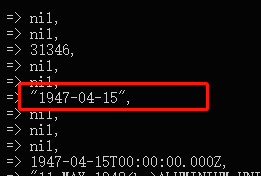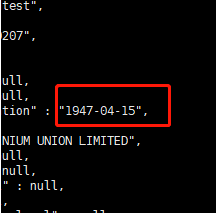- Ruby exception occurred: undefined method `time' for nil:NilClass
- Exception when executing JDBC query {:exception=>"Java::OrgJodaTime::IllegalInstantException: Illegal instant due to time zone offset transition (daylight savings time 'gap'): 1947-04-15T00:00:00.000 (Asia/Shanghai)"}
之前就发现过这两个问题,只不过那时候也是刚接触elasticsearch,所以采取的方法是不理会+改数据的形式。
看下我原本的logstash配置文件:
input {
jdbc {
#根据type的不同输出到es的不同索引
type => "hk_table"
jdbc_driver_library => "D:/mysql-connector-java-8.0.23/mysql-connector-java-8.0.23.jar"
jdbc_driver_class => "com.mysql.cj.jdbc.Driver"
jdbc_connection_string => "jdbc:mysql://localhost:3306/database"
jdbc_user => "root"
jdbc_password => "root"
jdbc_paging_enabled => true
jdbc_page_size => "50000"
tracking_column => "unix_ts_in_secs"
# 是否记录上次执行结果,true表示会将上次执行结果的tracking_column字段的值保存到last_run_metadata_path指定的文件中;
record_last_run => "true"
# record_last_run上次数据存放位置;
last_run_metadata_path => "D:/.logstash_jdbc_last_run"
clean_run => "false"
# 需要记录查询结果某字段的值时,此字段为true,否则默认tracking_column为timestamp的值;
use_column_value => true
tracking_column_type => "numeric"
schedule => "*/10 * * * * *"
statement => "SELECT *, UNIX_TIMESTAMP(up_date) AS unix_ts_in_secs FROM test WHERE (UNIX_TIMESTAMP(up_date) > :sql_last_value AND up_date < NOW()) ORDER BY up_date ASC"
}
}
filter {
ruby {
code => "
event.set('Participation_date', event.get('Participation_date').time.localtime + 8*60*60 + 5*60+43 + 60*60)
event.set('Retirement_date', event.get('Retirement_date').time.localtime + 8*60*60 + 5*60+43 + 60*60)
"
}
mutate {
copy => { "number" => "[@metadata][_id]"}
remove_field => ["unix_ts_in_secs"]
#用mutate插件先转换为string类型,gsub只处理string类型的数据,在用正则匹配,最终得到想要的日期
convert => {
"Participation_date"=> "string"
"Retirement_date"=> "string"
}
gsub => [
"Participation_date", "T([\S\s]*?)Z", "",
"Retirement_date", "T([\S\s]*?)Z", ""
]
}
}
output {
stdout { codec => "rubydebug"}
if [type] == "hk_table" {
elasticsearch {
index => "worldtest"
document_id => "hk-%{[@metadata][_id]}"
}
}
}
JDBC里面的配置,之前都在记录MYSQL同步数据至ES的测试历程写过,
先说下第一种异常的原因,由于mysql数据库中的Participation_date(类型为date)为空,因此在ruby中event无法获取到时间对象,调用time函数报错,该错误不影响logstash的后续同步;解决方法如下:
在jdbc代码块中,修改statement如下,添加日期对象获取
SELECT *,Participation_date as date_ico,Retirement_date as date_iso,
UNIX_TIMESTAMP(up_date) AS unix_ts_in_secs
FROM test WHERE (UNIX_TIMESTAMP(up_date) > :sql_last_value AND up_date < NOW()) ORDER BY up_date ASC
原来的ruby代码注释掉,添加判空条件,修改如下:
if [date_ico]{
ruby {
code => "
event.set('Participation_date', event.get('Participation_date').time.localtime + 8*60*60 + 5*60+43 + 60*60)
"
}
}
if [date_iso]{
ruby {
code => "
event.set('Retirement_date', event.get('Retirement_date').time.localtime + 8*60*60 + 5*60+43 + 60*60)
"
}
}
这种不修改也无所谓,因为不会中断logstash的同步数据。
第二种夏令时间隙导致的时区转换就令人难受了,因为它会导致logstash的同步数据数据中断,也就是说,mysql增量同步会始终卡在这一条数据上,后续不会再更新到elasticsearch了。查了很多文档,基本都是建议将数据库里面的时区设置成零时区。
首先查看一下数据库的时区,时区跟随系统,windows电脑系统时间为东八区
show global variables like '%time_zone%';

我原本以为将time_zone设置为零时区即可,毕竟system_time_zone是一个readonly变量,
set global time_zone = '+00:00';
FLUSH PRIVILEGES;
show global variables like '%time_zone%';

再次测试logstash同步,可以看到仍然报错,而且诡异的是结尾还带了(Asia/Shanghai)的提示
![]()
于是干脆把windows系统的时间也改成了零时区,重启mariadb(后来的测试中发现无需重启!!更正记录)。

再次重启logstash,顺利同步

利用搜索引擎也查了很多资料,关于mysql的system_time_zone确实无法更改,因而想要完整数据的同步,就是需要更改系统的时区为零时区。
实战,centos完整版测试:

SELECT VERSION();

报错如下:
![]()
查看时区列表:
timedatectl list-timezones
修改服务器时区:
timedatectl set-timezone UTC
date
==>Tue Sep 13 13:38:38 UTC 2022
重启数据库(可使用ps uax|grep mariadb 查看数据库PID是否更换),再次更正,无需重启数据库!
systemctl restart mysql
show global variables like '%time_zone%';

成功同步至elasticsearch

修改时区会有些麻烦,毕竟牵涉到web服务器的日志时间,crontab中定时运行的程序等等,也可以先修改成对应的UTC时区,再趁数据库不注意,偷偷改回东八区的时区吧,只要不重启mysql数据库,还是没啥问题的。
timedatectl set-timezone Asia/Shanghai